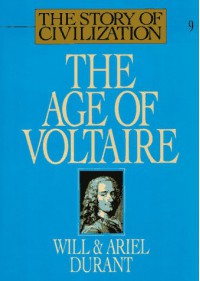The Age of Voltaire
 The authors look at the bricks that go into making up the building of civilization (and more so than with the other volumes in the series they mean the 'cultured man' (almost always a man in this telling)). But, sometimes to understand the whole building it's best not to dwell too much on each of the bricks separately as the authors do within this volume.
The authors look at the bricks that go into making up the building of civilization (and more so than with the other volumes in the series they mean the 'cultured man' (almost always a man in this telling)). But, sometimes to understand the whole building it's best not to dwell too much on each of the bricks separately as the authors do within this volume.There is a lack of context for most of the stories told about the people featured in this volume. Very little on the moving pieces that make up Western Europe as a whole. But, with the Durant's one always gets a beautiful turn of phase and deep thoughts thrown in from time to time, "a mob never has reason, but only has feelings". Voltaire, is always interesting: 'the Catholics believe they are eating the body, the Protestants think they are eating both bread and the body, and the Calvinist think they are eating only bread", "is it one person, one nature, and one will, or two persons, one nature, and one will......".
But as with every book in the series there is a weird anachronistic racism or misogynism that lurks around. They should have known better by 1965: 'who can trust a woman on the opinion of another woman". I guess, they think that was a funny line, but why did you put that woman's opinion in the story if you were going to negate her opinion by negating the opinion of all women regarding other women. There's other misogynism in the story, but it wouldn't be the Durants if they didn't have those kind of anachronisms floating within their story.
I don't really need one hour on what they claim was the first English 'novel' "Pamela", and its follow up "Clarissa" each with their multiple volumes by Richardson (as I was thinking during the long summaries about each novel, "Pamela tells nothing, and Clarissa tells it all"), but I really did not need to know what they contained in such excruciating detail. A lot of this Volume shares too much. I didn't think that about the other three volumes I've read in this series.
Sometimes, it's better to ignore the bricks and talk about the building. Also, there is more to Western Europe than just England and France (and just a little bit of Germany, but that's mostly because Voltaire was there. Good gosh, there was a German enlightenment and part of it was taking place during that time). The world is a moving web with interactions beyond just two nodes especially since those nodes exist in the real world. Regretfully, audible doesn't have Paul Hazards "Crisis of the European Mind, 1680-1715". It's a better book, and I would recommend that instead.







